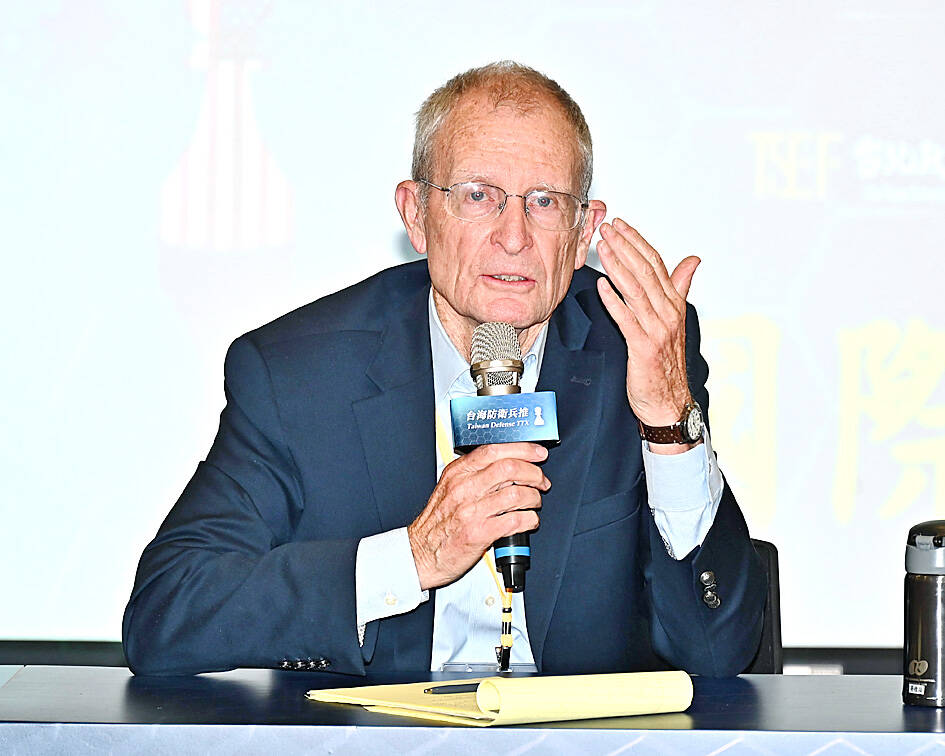The increase in Taiwan’s military capabilities and willingness to defend itself makes it “much more likely” that the US would come to its aid in the event of a Chinese attack, retired US admiral Dennis Blair said yesterday.
Blair, who is in Taipei to participate in a civilian-organized tabletop exercise, was responding to a reporter asking team leaders of the exercise to gauge US willingness to help defend Taiwan in the event of a Chinese invasion.
Two factors would influence a US president’s decision on whether to help defend Taiwan in such a scenario: how the conflict starts and whether Taiwan has the ability and willingness to defend itself, said Blair, a former US Pacific fleet commander.

Photo: Tu Chien-rong, Taipei Times
The second factor would “have a great deal of effect” on whether the US would become involved, he said.
“I’ve been coming to Taiwan for the most recent 20 years, participating in Taiwanese exercises, observing Taiwan, and I certainly see that the ability of Taiwan to defend itself, to defend against Chinese aggression, the willingness to do so has been increasing,” he said. “And that would mean that the United States would be much more likely to come to the assistance of Taiwan under this matter of great concern.”
He referenced pledges by former US president Joe Biden and a remark by US Secretary of Defense Pete Hegseth at the Shangri-La Dialogue in Singapore that the US would use military force to defend Taiwan in the event of a Chinese invasion as indications of the US’ commitment to Taiwan’s defense.
Blair, a former US national intelligence director, also referenced the Taiwan Relations Act, which, in addition to stating that the US would ensure Taiwan has sufficient defense capabilities, states that the US considers any effort to determine the future of Taiwan by non-peaceful means a matter of “grave concern.”
“This means it may involve military force,” he said.
However, if the conflict was triggered by Taiwanese provocations, such as moves toward independence, the US would be less likely to become involved, he added.
For the Taiwanese and US governments, the objective is to deter, prevent and discourage any kind of Chinese aggression by having enough capability, and by making it clear that “we would fight if it comes to that,” he said.
From 2003 to 2007, Blair participated in the Han Kuang military exercises as a senior observer, during which he made suggestions to Taiwan that completed the infrastructure of the critical drills, including the adoption of the Joint Theater Level Simulation computerized war-gaming system and the Joint Training System, former chief of the general staff Lee Hsi-min (李喜明) said.
Lee heads the Taipei-based think tank Center for Peace and Security, one of the organizers of the war games.

NEXT GENERATION: The four plants in the Central Taiwan Science Park, designated Fab 25, would consist of four 1.4-nanometer wafer manufacturing plants, TSMC said Taiwan Semiconductor Manufacturing Co (TSMC, 台積電) plans to begin construction of four new plants later this year, with the aim to officially launch production of 2-nanometer semiconductor wafers by late 2028, Central Taiwan Science Park Bureau director-general Hsu Maw-shin (許茂新) said. Hsu made the announcement at an event on Friday evening celebrating the Central Taiwan Science Park’s 22nd anniversary. The second phase of the park’s expansion would commence with the initial construction of water detention ponds and other structures aimed at soil and water conservation, Hsu said. TSMC has officially leased the land, with the Central Taiwan Science Park having handed over the

AUKUS: The Australian Ambassador to the US said his country is working with the Pentagon and he is confident that submarine issues will be resolved Australian Ambassador to the US Kevin Rudd on Friday said that if Taiwan were to fall to China’s occupation, it would unleash China’s military capacities and capabilities more broadly. He also said his country is working with the Pentagon on the US Department of Defense’s review of the AUKUS submarine project and is confident that all issues raised will be resolved. Rudd, who served as Australian prime minister from 2007 to 2010 and for three months in 2013, made the remarks at the Aspen Security Forum in Colorado and stressed the longstanding US-Australia alliance and his close relationship with the US Undersecretary

‘WORLD WAR III’: Republican Representative Marjorie Taylor Greene said the aid would inflame tensions, but her amendment was rejected 421 votes against six The US House of Representatives on Friday passed the Department of Defense Appropriations Act for fiscal 2026, which includes US$500 million for Taiwan. The bill, which totals US$831.5 billion in discretionary spending, passed in a 221-209 vote. According to the bill, the funds for Taiwan would be administered by the US Defense Security Cooperation Agency and would remain available through Sept. 30, 2027, for the Taiwan Security Cooperation Initiative. The legislation authorizes the US Secretary of Defense, with the agreement of the US Secretary of State, to use the funds to assist Taiwan in procuring defense articles and services, and military training. Republican Representative

TAIWAN IS TAIWAN: US Representative Tom Tiffany said the amendment was not controversial, as ‘Taiwan is not — nor has it ever been — part of Communist China’ The US House of Representatives on Friday passed an amendment banning the US Department of Defense from creating, buying or displaying any map that shows Taiwan as part of the People’s Republic of China (PRC). The “Honest Maps” amendment was approved in a voice vote on Friday as part of the Department of Defense Appropriations Act for the 2026 fiscal year. The amendment prohibits using any funds from the act to create, buy or display maps that show Taiwan, Kinmen, Matsu, Penghu, Wuciou (烏坵), Green Island (綠島) or Orchid Island (Lanyu, 蘭嶼) as part of the PRC. The act includes US$831.5 billion in